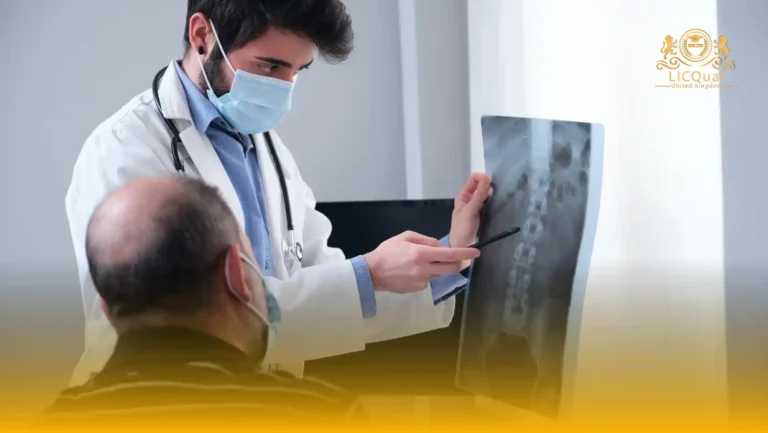The LICQual Level 7 Postgraduate Diploma in Tropical Medicine (PgDTM) is a specialised qualification designed for experienced healthcare professionals seeking to advance their expertise in the prevention, diagnosis, and management of tropical and infectious diseases. This programme is not intended for fresh candidates; instead, it is aimed at learners with a medical or clinical background who wish to enhance their career prospects, broaden their knowledge base, and strengthen their Continuing Professional Development (CPD).
Tropical medicine plays a vital role in global healthcare, addressing challenges such as malaria, tuberculosis, dengue fever, parasitic infections, and emerging diseases that disproportionately affect tropical and subtropical regions. This advanced diploma provides learners with in-depth knowledge of disease mechanisms, epidemiology, clinical management, and strategies for controlling and preventing tropical diseases. It also equips learners with research skills and evidence-based practices to contribute effectively to healthcare systems worldwide.
Centres delivering this qualification must ensure they have competent and qualified staff, along with access to all necessary resources, including updated learning materials, laboratory facilities, and digital platforms. This ensures that learners benefit from a high-quality training environment that fosters academic excellence and practical competence.
The PgDTM is internationally recognised and valued for its academic rigour and relevance to modern healthcare challenges. By completing this qualification, learners will gain the skills and credibility to take on senior roles in healthcare organisations, research institutions, humanitarian services, and global health initiatives.
Course Overview
Qualification Title
LICQual Level 7 Postgraduate Diploma in Tropical Medicine (PgDTM)
Total Units
6
Total Credits
120
GLH
600
Qualification #
LICQ2200972
Qualification Specification
To enroll in the LICQual Level 7 Postgraduate Diploma in Tropical Medicine (PgDTM), applicants must meet the following criteria:
|
Qualification# |
Unit Title |
Credits |
GLH |
|---|---|---|---|
|
LICQ2200972-1 |
Foundations of Tropical Medicine and Global Health |
20 |
100 |
|
LICQ2200972-2 |
Parasitic and Vector-Borne Diseases |
20 |
100 |
|
LICQ2200972-3 |
Bacterial, Viral, and Fungal Infections in the Tropics |
20 |
100 |
|
LICQ2200972-4 |
Clinical Management of Tropical Diseases |
20 |
100 |
|
LICQ2200972-5 |
Public Health Strategies and Disease Control |
20 |
100 |
|
LICQ2200972-6 |
Research Methods in Tropical Medicine |
20 |
100 |
By the end of this course, learners will be able to:
Unit 1: Foundations of Tropical Medicine and Global Health
Learners will be able to:
- Critically evaluate the principles of tropical medicine and its role in global health.
- Analyse the epidemiology and distribution of tropical diseases across diverse populations.
- Assess the social, economic, and environmental factors influencing disease prevalence.
- Apply global health frameworks to the prevention and control of tropical diseases.
Unit 2: Parasitic and Vector-Borne Diseases
Learners will be able to:
- Demonstrate advanced understanding of parasitic and vector-borne diseases, including their life cycles and transmission.
- Critically evaluate diagnostic techniques and treatment protocols for malaria, schistosomiasis, and other parasitic infections.
- Assess strategies for vector control and disease prevention in tropical regions.
- Apply evidence-based approaches to the clinical management of parasitic diseases.
Unit 3: Bacterial, Viral, and Fungal Infections in the Tropics
Learners will be able to:
- Critically analyse the pathophysiology and clinical manifestations of major infectious diseases in the tropics.
- Evaluate diagnostic tools and laboratory methods for identifying bacterial, viral, and fungal infections.
- Apply evidence-based treatment and prevention strategies for diseases such as tuberculosis, HIV/AIDS, dengue, and Ebola.
- Assess emerging global health threats and their impact on tropical medicine.
Unit 4: Clinical Management of Tropical Diseases
Learners will be able to:
- Apply advanced clinical reasoning to the diagnosis and treatment of tropical diseases.
- Critically evaluate therapeutic interventions and long-term management strategies.
- Assess the role of multidisciplinary care in improving patient outcomes.
- Integrate ethical and culturally sensitive practices in the management of tropical diseases.
Unit 5: Public Health Strategies and Disease Control
Learners will be able to:
- Critically evaluate public health policies and interventions in tropical medicine.
- Analyse the effectiveness of vaccination programmes and disease prevention strategies.
- Assess methods of outbreak investigation, response, and control in resource-limited settings.
- Apply public health frameworks to reduce disease burden and improve population health in tropical regions.
Unit 6: Research Methods in Tropical Medicine
Learners will be able to:
- Demonstrate advanced research design, data collection, and analytical skills.
- Critically evaluate scientific literature and apply findings to tropical medicine practice.
- Develop independent research projects addressing current challenges in tropical and infectious diseases.
- Apply ethical and professional standards in conducting and disseminating research.
The LICQual Level 7 Postgraduate Diploma in Tropical Medicine (PgDTM) is designed for a wide range of learners. Whether you are an experienced healthcare professional, a beginner entering the medical field, or a career changer seeking new opportunities, this internationally recognized postgraduate diploma provides advanced knowledge, practical skills, and accredited qualifications. The PgDTM is flexible, globally recognized, and tailored to meet the needs of professionals at different stages of their careers, making it a perfect choice for anyone passionate about tropical and infectious diseases.
1. Experienced Medical Professionals
- Doctors seeking advanced specialization in tropical medicine and infectious diseases
- Healthcare leaders preparing for senior roles in hospitals and clinics
- Specialists aiming to strengthen diagnostic and patient care expertise
- Professionals looking to earn CPD credits and international recognition
- Practitioners wanting to expand authority in evidence-based tropical medicine
2. Beginners Entering Healthcare and Tropical Medicine
- Fresh graduates interested in postgraduate qualifications in tropical medicine
- Students aiming to build strong foundations in parasitology, virology, and epidemiology
- Learners seeking UK-accredited diplomas for global career opportunities
- Beginners who want structured, flexible learning with practical application
- Individuals motivated to gain advanced knowledge early in their careers
3. Career Changers Transitioning into Healthcare
- Professionals from other fields seeking a new career in tropical medicine
- Individuals motivated to enter healthcare with internationally recognized qualifications
- Career changers looking for flexible postgraduate study options
- Learners seeking practical training in tropical diseases and patient care
- Those aiming to secure stable, rewarding roles in healthcare institutions
4. International Healthcare Practitioners
- Doctors and medical technologists outside the UK seeking accredited qualifications
- Professionals aiming to meet international healthcare standards
- Learners interested in globally recognized postgraduate diplomas
- Practitioners seeking career mobility across countries and institutions
- Healthcare workers wanting to enhance diagnostic accuracy worldwide
5. Academic Researchers and Educators
- Researchers focusing on advanced tropical disease studies and global health
- Educators seeking postgraduate credentials to strengthen teaching authority
- Medical academics aiming to publish or contribute to tropical medicine research
- Professionals interested in evidence-based curriculum development
- Scholars looking to align with EEAT principles in healthcare education
6. Hospital and Laboratory Staff
- Laboratory technicians aiming to upgrade qualifications to postgraduate level
- Staff seeking advanced training in tropical diagnostics and patient care
- Healthcare workers preparing for leadership roles in labs and diagnostic centers
- Professionals wanting to improve patient outcomes through accurate testing
- Teams seeking internationally recognized CPD qualifications
7. Public Health and Global Health Specialists
- Public health professionals seeking advanced tropical medicine knowledge
- Specialists aiming to integrate tropical medicine into patient care strategies
- Healthcare workers focusing on infectious diseases and emergency medicine
- Practitioners looking to strengthen evidence-based healthcare delivery
- Professionals preparing for senior roles in public health institutions
To ensure the highest standards of training and learner success, centres offering the LICQual Level 7 Postgraduate Diploma in Tropical Medicine (PgDTM) must meet the following requirements:
- Qualified and Experienced Faculty
Centres must employ trainers, lecturers, and assessors with advanced qualifications in medicine, tropical health, infectious diseases, epidemiology, or related fields, along with relevant professional experience. - Adequate Learning Resources
Centres should provide up-to-date textbooks, journals, research databases, e-learning platforms, and reference materials related to tropical medicine, infectious diseases, and global health. - Clinical and Laboratory Facilities
Access to appropriate clinical training environments, diagnostic tools, laboratory resources, and simulation facilities is essential for practical learning and skill development. - Robust Quality Assurance
Centres must maintain quality assurance systems to monitor teaching, assessments, learner progress, and compliance with international postgraduate diploma standards. - Technology-Enabled Learning
Institutions should provide reliable access to digital platforms, virtual learning environments (VLEs), and online communication tools to support blended and distance learning where required. - Assessment and Evaluation Support
Centres must ensure that assessments are fair, transparent, and aligned with learning outcomes, providing constructive feedback to support learner achievement. - Commitment to Learner Success
Institutions should foster a supportive learning environment, offering academic guidance, mentoring, and career development opportunities tailored to healthcare professionals. - Compliance with Ethical and Professional Standards
Centres must adhere to the highest ethical, academic, and professional standards in delivering this postgraduate diploma in line with global healthcare education practices.
Assessment and Verification
All units within this qualification are subject to internal assessment by the approved centre and external verification by LICQual. The qualification follows a criterion-referenced assessment approach, ensuring that learners meet all specified learning outcomes.
To achieve a ‘Pass’ in any unit, learners must provide valid, sufficient, and authentic evidence demonstrating their attainment of all learning outcomes and compliance with the prescribed assessment criteria. The Assessor is responsible for evaluating the evidence and determining whether the learner has successfully met the required standards.
Assessors must maintain a clear and comprehensive audit trail, documenting the basis for their assessment decisions to ensure transparency, consistency, and compliance with quality assurance requirements.







